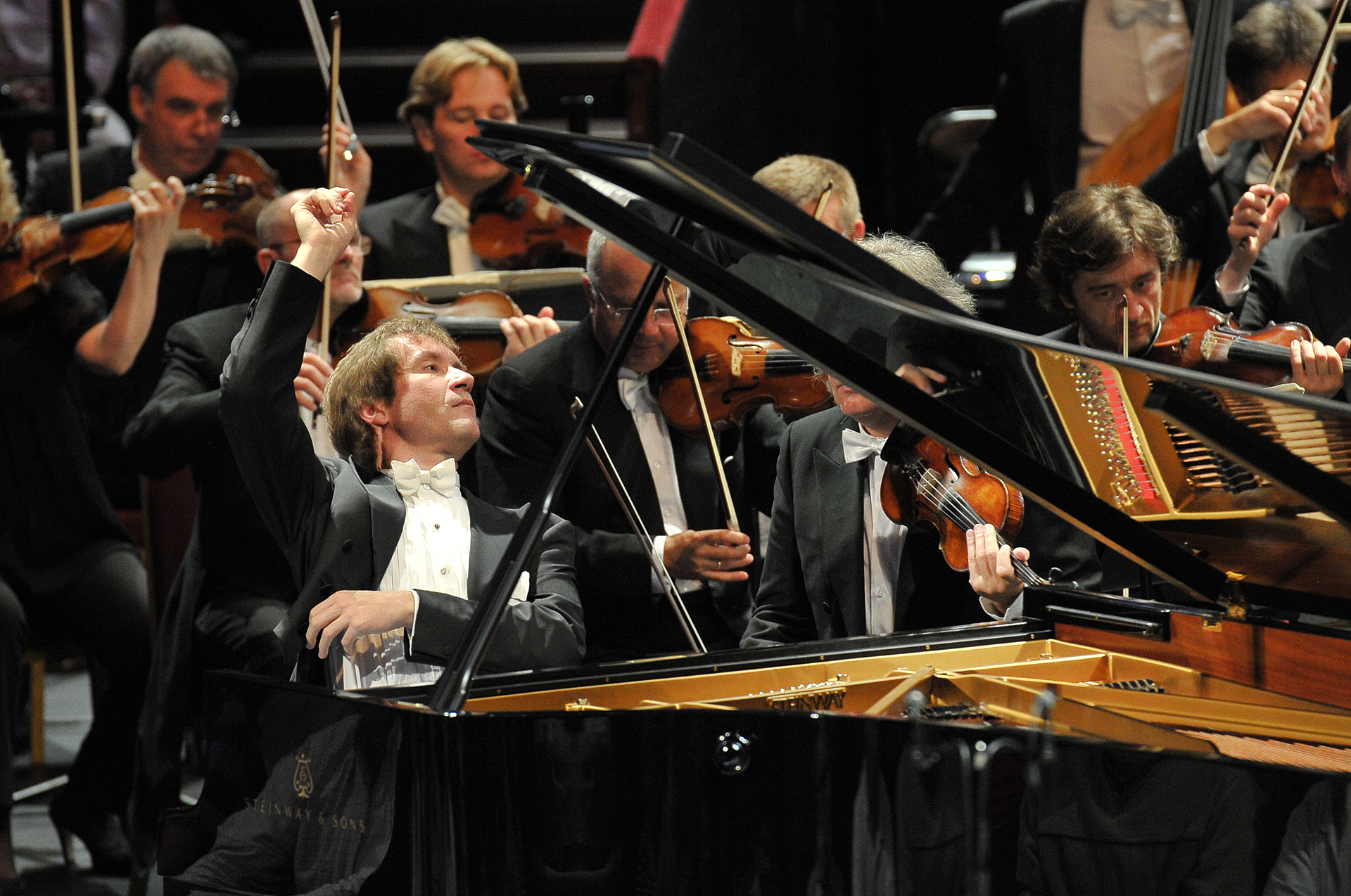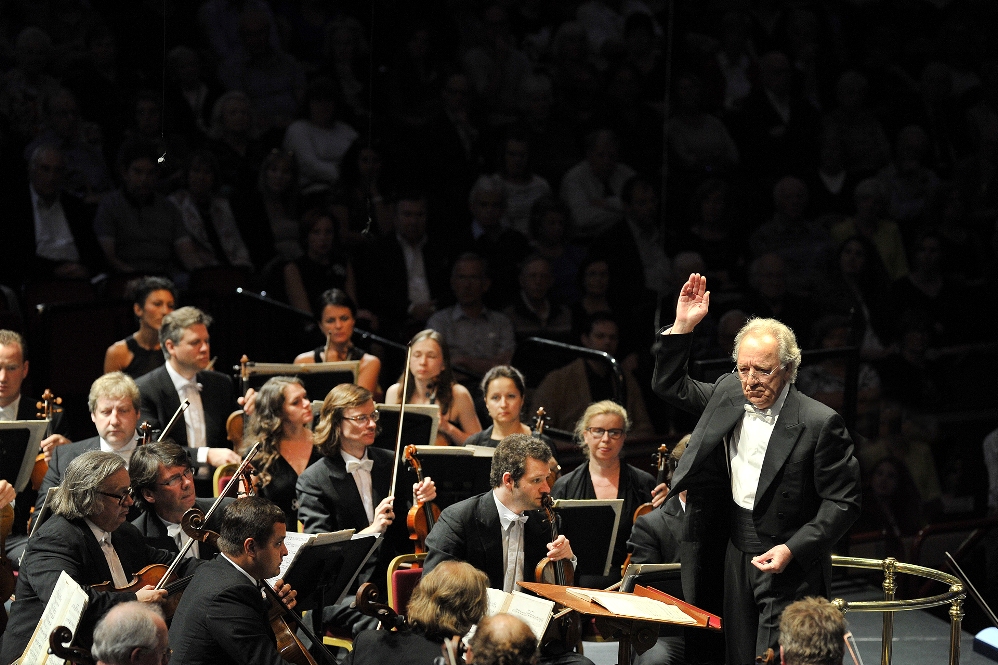Prom 70: Lugansky, St Petersburg Philharmonic Orchestra, Temirkanov | reviews, news & interviews
Prom 70: Lugansky, St Petersburg Philharmonic Orchestra, Temirkanov
Prom 70: Lugansky, St Petersburg Philharmonic Orchestra, Temirkanov
Standard Russian programme, extraordinary performances
Russian classics evening at the Proms? It could be what Alexandra Coghlan, writing about Prom 69, described as “another night at the musical office”. But given the masters in charge of two masterpieces fusing storytelling with symphonic sweep and one deservedly popular standard, there was no chance of that.
Yes, this is still an orchestra with a voice, a remarkably svelte one these days as perfectly-intoned and sophisticated brass chords and dark strings outlined at the start of Tchaikovsky’s Francesca da Rimini. The hellish whirlwinds that envelop Dante’s unhappy wife and her husband's brother might have been a bit more febrile in Temirkanov’s youth, but his unique flexibility, his total control of the most extreme rubato, made what is perhaps the greatest of all Tchaikovsky’s love scenes into something taxing and even deep, led by the first of the evening’s remarkable parade of infinitely free and nuanced orchestral solos from clarinettist Andrei Lukhin. In the spectral central section, strings and other woodwind players – the first row placed unusually on the lower level along with the horns – sounded not of this world, an effect that would be repeated in Rimsky-Korsakov’s Scheherazade after the interval.

His proud and upward-inclining position at the keyboard gives weight to the beautiful sound he makes – as with Leonskaja the other week, younger Russian pianists storing up posture problems should take note – and the rolling movement seems to add freedom. Nor were the orchestra behind in this, making a genuinely sumptuous triumph out of the last big tune’s final flourishing. Lugansky’s encore was one of three solo-instrument slices of post-concerto perfection I’ve heard this season, his infinitely shaded and crowd-stilling account of the mysterious G minor Etude-Tableau equal to Nikolaj Znaider’s Bach and Leonskaja's Chopin.
Was Scheherazade going to succumb to kitsch, though? Not a bit of it. This, too, was about weaving a spell, keeping the execution-bent husband’s fatal decree at bay with easily the most captivating and subtle violin solo I’ve ever heard from leader Lev Klychkov, accompanied by no less artistic arpeggios from harpist Anna Makarova. Temirkanov (pictured below) sent Sinbad’s ship swiftly flowing on an agitated sea, pulling out some stops for the lovely woodwind solos in the becalmed moments and making of the first movement a prelude to the heightened drama of the second, where the freedom of the wind principals reached an apogee of sensuousness and, in the flute’s wistful breather towards the end, aching nostalgia.
More dramatic tempo-contrasts came in the two lovely melodies of “The Young Prince and Princess”; which is which no-one seems to know, but the sashaying march-miniature went at a delectable lick once one had adjusted to the shock, and the big theme had its climactic head from what is still one of the world’s great string sections. Rimsky’s brilliant symphonic synthesis in the finale sped along, too, first trumpeter Igor Sharapov tonguing furiously in the oriental tarantella before dominating the last-minute switch back to Sinbad on the billowing sea (not sure what the timpani tattoo after the tam-tam crash as the ship shatters was all about, but it had its effect). Klychkov and Makarova returned to set the final seal of enchantment, a surprisingly profound conclusion to a work which should never be just a showpiece.
Temirkanov’s encores haven’t changed much over the years, but I think we were all happy to hear his suppleness at its most magnetic in the Pas de deux from Tchaikovsky’s The Nutcracker – with just a bit more space as the composer's scale descends from major into minor – and the delicate Ravelian teases in Shchedrin's discreetly naughty arrangement of Albéniz’s Tango in D. One usual crowdpleaser Temirkanov has wielded in a past Prom, “Nimrod” from Elgar’s Enigma Variations, wasn’t to be heard, for once: that will have to wait until tonight, when the Russians play the entire score. Lucky those of you who can make it – and if you want a place in the Arena, arrive very early; last night there were at least several hundred queuers at 7.25 pm who weren't going to get in. Which means a potential live audience of around 6,000. Who said classical music was on its last legs?
- Listen to this concert for the next month on the BBC iPlayer
- David Nice's blog on talking Rachmaninov with Lugansky
Read theartsdesk's reviews of other concerts from the BBC Proms 2015
rating
Explore topics
Share this article
The future of Arts Journalism
You can stop theartsdesk.com closing!
We urgently need financing to survive. Our fundraising drive has thus far raised £49,000 but we need to reach £100,000 or we will be forced to close. Please contribute here: https://gofund.me/c3f6033d
And if you can forward this information to anyone who might assist, we’d be grateful.

Subscribe to theartsdesk.com
Thank you for continuing to read our work on theartsdesk.com. For unlimited access to every article in its entirety, including our archive of more than 15,000 pieces, we're asking for £5 per month or £40 per year. We feel it's a very good deal, and hope you do too.
To take a subscription now simply click here.
And if you're looking for that extra gift for a friend or family member, why not treat them to a theartsdesk.com gift subscription?
more Classical music
 Echo Vocal Ensemble, Latto, Union Chapel review - eclectic choral programme garlanded with dance
Beautiful singing at the heart of an imaginative and stylistically varied concert
Echo Vocal Ensemble, Latto, Union Chapel review - eclectic choral programme garlanded with dance
Beautiful singing at the heart of an imaginative and stylistically varied concert
 Scott, Irish Baroque Orchestra, Whelan, RIAM, Dublin review - towards a Mozart masterpiece
Characteristic joy and enlightenment from this team, but a valveless horn brings problems
Scott, Irish Baroque Orchestra, Whelan, RIAM, Dublin review - towards a Mozart masterpiece
Characteristic joy and enlightenment from this team, but a valveless horn brings problems
 Classical CDs: Voice flutes, flugelhorns and froth
Baroque sonatas, English orchestral music and an emotionally-charged vocal recital
Classical CDs: Voice flutes, flugelhorns and froth
Baroque sonatas, English orchestral music and an emotionally-charged vocal recital
 Kanneh-Mason, Britten Sinfonia, Shave, Milton Court - a grin and a big beaming smile
A pair of striking contemporary pieces alongside two old favourites
Kanneh-Mason, Britten Sinfonia, Shave, Milton Court - a grin and a big beaming smile
A pair of striking contemporary pieces alongside two old favourites
 theartsdesk at the New Ross Piano Festival - Finghin Collins’ musical rainbow
From revelatory Bach played with astounding maturity by a 22 year old to four-hand jazz
theartsdesk at the New Ross Piano Festival - Finghin Collins’ musical rainbow
From revelatory Bach played with astounding maturity by a 22 year old to four-hand jazz
 First Person: Manchester Camerata's Head of Artistic Planning Clara Marshall Cawley on questioning the status quo
Five days of free events with all sorts of audiences around Manchester starts tomorrow
First Person: Manchester Camerata's Head of Artistic Planning Clara Marshall Cawley on questioning the status quo
Five days of free events with all sorts of audiences around Manchester starts tomorrow
 Goldscheider, Brother Tree Sound, Kings Place review - music of hope from a young composer
Unusual combination of horn, strings and electronics makes for some intriguing listening
Goldscheider, Brother Tree Sound, Kings Place review - music of hope from a young composer
Unusual combination of horn, strings and electronics makes for some intriguing listening
 theartsdesk Q&A: composer Donghoon Shin on his new concerto for pianist Seong-Jin Cho
Classical music makes its debut at London's K-Music Festival
theartsdesk Q&A: composer Donghoon Shin on his new concerto for pianist Seong-Jin Cho
Classical music makes its debut at London's K-Music Festival
 Helleur-Simcock, Hallé, Wong, Bridgewater Hall, Manchester review - moving lyricism in Elgar’s concerto
Season opener brings lyrical beauty, crisp confidence and a proper Romantic wallow
Helleur-Simcock, Hallé, Wong, Bridgewater Hall, Manchester review - moving lyricism in Elgar’s concerto
Season opener brings lyrical beauty, crisp confidence and a proper Romantic wallow
 Kohout, Spence, Braun, Manchester Camerata, Huth, RNCM, Manchester review - joy, insight, imagination and unanimity
Celebration of the past with stars of the future at the Royal Northern College
Kohout, Spence, Braun, Manchester Camerata, Huth, RNCM, Manchester review - joy, insight, imagination and unanimity
Celebration of the past with stars of the future at the Royal Northern College


Add comment